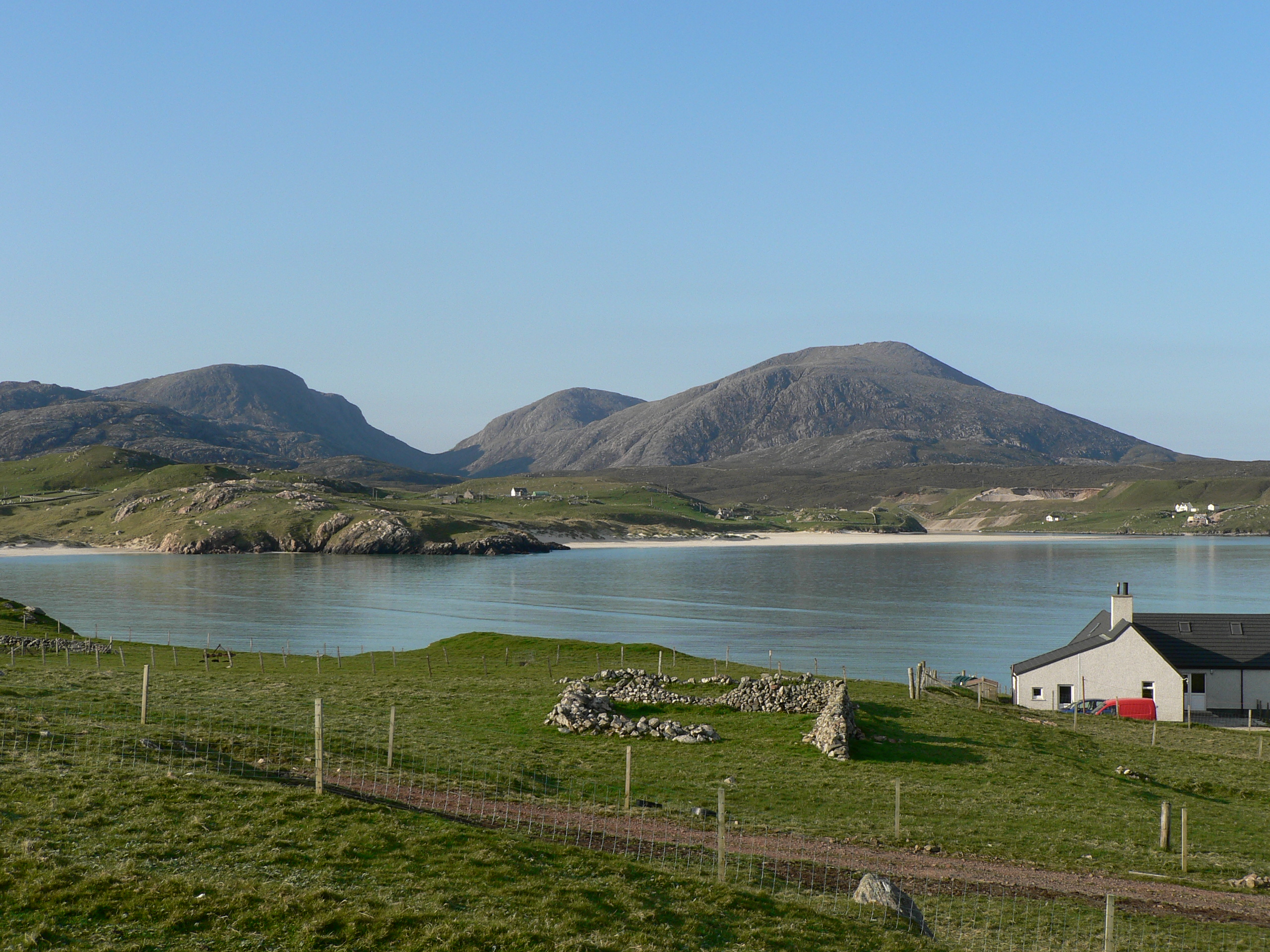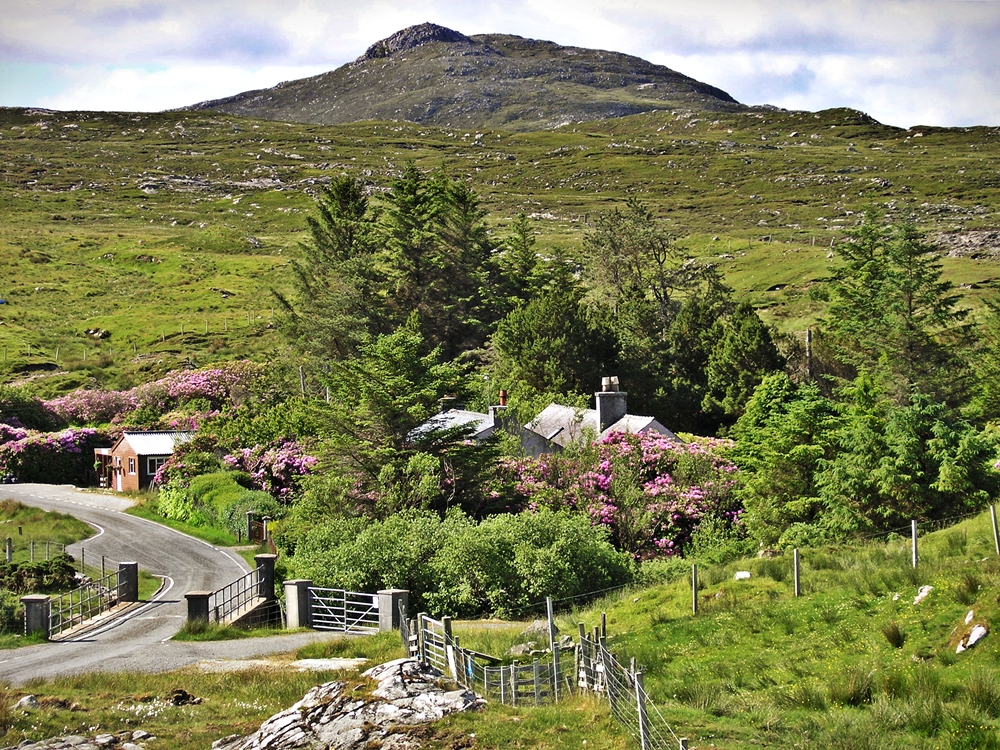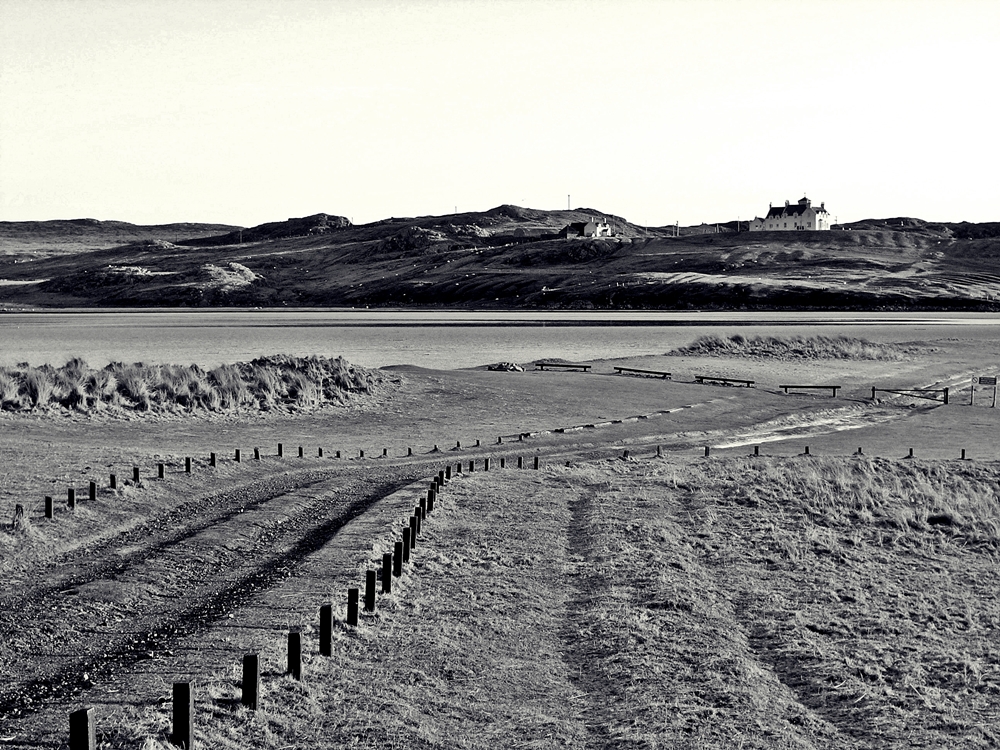Tag: uiglodge
The Long Road to Stornoway (1893)
The Uig POs and their Postmarks
Bibliography: Salmon and Sea Trout Angling on Lewis and Harris (David SD Jones)
The Gamekeeper’s Family
By Open Sea from Kinlochresort
An further extract from the unpublished memoirs of Rev Col AJ Mackenzie, born Kinlochresort in 1887. Here he tells of how the family came to be at Kinlochresort, and also how they left it for the gamekeeper’s house at Uig Lodge. His account of the pleasures of Traigh Uig is here.
My father was a gamekeeper who worked on the Gruinard Estate (Wester Ross). It happened he had made the acquaintance of two brothers named Paget who were impressed with his qualities both as a keeper and an all round estate worker. They had taken the fishing and shooting of Barvas, in the Island of Lewis. Dissatisfied with the amount of sport they obtained and knowing that it was capable of much better showing, they asked my father if he would consider coming to Barvas with a view to trying to improve its fishing and shooting. It did not take long to make the necessary arrangements and one day the little family with all their worldy goods and chattels embarked on the good ship Ondine for Stornoway. In due course they found themselves at Barvas and settled in a modest thatched cottage there being no lodge or keeper’s house available. For five years they lived there. It was here the life long friendship began with James Young who leased the bag net fishing rights in several parts of Lewis including Kinresort.
The Pagets ultimately severed their connection with Barvas but the Lewis Estate retained my father’s services and offered him the position of keeper at Kinresort where there was a house that would more adequately meet the needs of the increasing family. The house, unfortunately, would not be available for a year. In the meantime there was the problem of where to live. This was solved by their old friend James Young who offered them accommodation in a house which he owned in Carloway in connection with his salmon fishing. Taking a few necessary pieces of furniture with them and storing the remainder in one of Young’s store house at Barvas, they proceeded to Carloway where they resided a whole year before they finally settled in at Kinresort. It was during this stay at Carloway, that the disastrous fire occurred in the store house at Barvas in which all their furniture was destroyed. The friendship with James Young continued at Kinresort.
The Education Act of 1872 was now in force and large well equipped schools with highly qualified teachers were available in many districts. One of these was in the vicinity of the extensive fishing and shooting of Uig. The head keeper here had no family and when my father suggested to him that they should together approach the Lewis Estate with a view to exchanging spheres, he readily agreed. The proposal was put to the chief authority who was known by the imposing title of the Chamberlain of the Lews.
Starting at Crowlista School
An extract from the unpublished memoirs of Rev Col AJ Mackenzie, son of the gamekeeper Roderick Mackenzie. AJ was born in 1887 in Kinlochresort and moved with his family to the keeper’s house at Uig Lodge, where he began at Crowlista School.
In May 1892 after the spring holidays, I began my formal education. I had never been at school before except for one day at Kinlochresort when my mother sent me with the other boys thinking I would be happier at school, than alone by myself all day at home. I soon decided that I thought otherwise and as I did not show my enthusiasm to repeat the experience next day, I was not pressed to go any more. But now by law I was compelled to go to school and there was no evading it.
I set off in high spirits with the rest of the boys, buoyed up with their accounts of the joy of life at school. Hitherto I had only looked at the school from a distance and as I drew nearer I was conscious of a conflict of feelings. I began to feel that I was about to be swallowed up in something new and strange and that things would never be quite the same again. There were over a hundred pupils in the school at that time. It was in fact hopelessly over crowded, in the following year an extension was put to it, that was another thrill for us boys to see masons, joiners and painters at work.
I had never seen so many children together before, but what filled me with amazement was the amount of noise they made with their chattering. The master, obviously, had not come in yet. When he did, the scene underwent an astonishingly rapid transformation. He picked up a thick cane and gave half a dozen hard smacks with it on the blackboard. At that instance a dead silence fell on the school. I had never seen such behaviour before and I do not in the least exaggerate when I say I was not a little scared. It took me a little time to discover that our teacher, Mr Stevenson was not as terrifying a person as he appeared to be. The first day passed off uneventfully; the second was not so happy; and the third full of doubt and forebodings. The freedom I had so long enjoyed was gone unless I could do something to recover it.
The forth day was a historic one. I set out as usual with the others but when just out of sight of home I decided on my course of action. I sat down, and calmly announced to the boys that I was not going to school that day. Curiously they did not attempt to persuade me; they may have thought that a more effective authority would soon see that. The authority was soon forthcoming in the person of my mother. She evidently had a suspicion that I had something in my mind when I set out that morning, so she came out to see from the near hill if I was on my way over the moor path to school. Her unexpected appearance startled me, but in no way lessened my determination to make a bid to free myself from the obligations of school that day and for ever.
Dolly Doctor
Recruitment in 1793
From a manuscript by (as far as I can make out) Rev Col AJ Mackenzie, son of Roderick Mackenzie, gamekeeper at Luachair and Uig Lodge. According to tradition, men were compelled to join the army when Seaforth was raising the 78th Seaforth Highlanders in 1793. When he arrived in Lewis, the men of Uig took to the hills and established themselves at Cnoc a’Champ, near the site of Uig Lodge, and a boat rowed by women was sent to meet Seaforth at Callanish. Seaforth was not best pleased and set off with the minister, Rev Hugh Munro, to speak to the men. Rev Munro persuaded them to be more patriotic, and an assurance was given that only one son would be taken from a family, or two where the family was large. The minister’s own son, Ensign John Munro, was enlisted in 1804 and subsequently killed at Java. AJ Mackenzie here looks at the traditions surrounding the giving of the King’s shilling, particularly in light of the assertion by Chamberlain John Munro Mackenzie (grandson to Rev Munro and author of the published Diary of 1851) to the Napier Commission that enlisting was voluntary.
The primary object of Munro Mackenzie’s examination by Lord Napier’s Commission was apparently to discover what were the means employed by Seaforth and his officers in procuring recruits for his regiment – whether recruiting was by compulsion backed by threats of eviction, or by voluntary enlistment backed by promises of future reward.
This is a point on which I have never been able to find definite information. Mackenzie in his evidence was emphatic on the point that there was no compulsion of an sort, and so far as I know there was no recognised authority that could compel a man to join the army. Yet in the traditions of the people themselves there is the definite impression, whether mistaken or not, of a time when men were compelled to send their sons into the army. Again and again I have heard reference to a time when men were compelled by some authority to join the army – “an uair a bha iad ‘gan toirt air falbh do’n arm“. Four incidents bearing on this point occur to me.
There used to be pointed out on Fidean Eristeadh a remarkably wide ditch which was alleged to have been jumped by a young man of the village when pursued by soldiers who were seeking to apprehend him for military service. In this case, however, it is just possible that the man was a deserter, and that his pursuit by soldiers was in accordance with military law.
Building the House at Gisla
From Emily Macdonald’s Twenty Years of Hebridean Memories (1939). Emily and her husband Dolly Doctor owned Uig Lodge but it was permanently let to tenants.
On our next two holidays in Lewis, we managed to get rooms in Uig for a few days’ visit to the part of the Island we loved so much. But there were few rooms obtainable for love or money, and more and more people wanting those few, so we began to think we must set about obtaining a little house for ourselves in the district. The Lodge was still let and we saw no prospect of being able to live in it for many a year on account of the expense.
Gisla at once presented itself to our minds as a suitable spot in which to build an easily-run house of the bungalow type.
Gisla is included in Uig, and therefore belonged to us, but there was a difficulty to be overcome before we could tart building. The old farmer-crofter who lived at Gisla had, under the Crofters’ Act, the full grazing rights of the place, and on going over to interview him, we found him to be extremely “land-conscious.” Therefore, it was no easy matter coming to an agreement with him as to where we should build. We could, of course, have applied to the Scottish Land Court to resume a piece of land for our own use, and many years afterwards we had recourse to this proceeding when we found we required more land for a bigger garden.
Owning Uig Lodge
From Emily Macdonald’s Twenty Years of Hebridean Memories (1939). In 1923 Emily, niece of Lord Leverhulme, was married to Donald Macdonald, Dolly Doctor, who had Uig connections and later wrote Tales and Traditions of the Lews. They were given Uig Lodge as a wedding present.
Stornoway was reached some six hours after leaving Kyle, and we went that summer evening to my mother-in-law’s house in New Street, where we had arranged to stay for part of our holiday. It was while we were at New Street that I spoke a few joking words which afterwards led to our possessing Uig Lodge and Gisla. My uncle came to have tea with us one afternoon, and during the course of his visit, told us of his failure to come to an agreement with the Government over his schemes for the welfare and development of Lewis. Something was said about giving up the Island, and I said, “If ever you think of selling Uig Lodge, give me first refusal.” I knew, of course, that we couldn’t even think of buying a property a quarter of the value, but it was just one of those things one says on the spur of the moment.
A few weeks after our return to London, my uncle asked us if we would like to possess Uig, and we went over to Hampstead to discuss the matter with him. Of course, I need hardly say we were delighted to accept such a wonderful gift, but there were various details to be considered. My uncle wished to give us the Lodge with its attendant fishing and shooting rights, but did not wish to burden us with the worries and responsibilities of the hundreds of crofts in the district. On taking legal advice, however, it was found that though one could possess fishing rights without land, one could only be the owner of shooting rights if one owned the ground also. My uncle saw the pitfalls in this arrangement at once. Among other difficulties, should any of the crofters default on their rent, we should find ourselves out of pocket, as it is certain that we could not do likewise when it came to our paying the rates. Over a large area like Uig (it is a hundred square miles) this might become a most serious situation. Anyway, the end of it was that my uncle suggested we should try to run the estate intact, and if it proved too much of a burden, he would take the land with its shooting rights and crofts back again. To safeguard our private property, he made his gift in the form of a limited company, so that should the estate go bankrupt, at least we should not lose more than itself.



